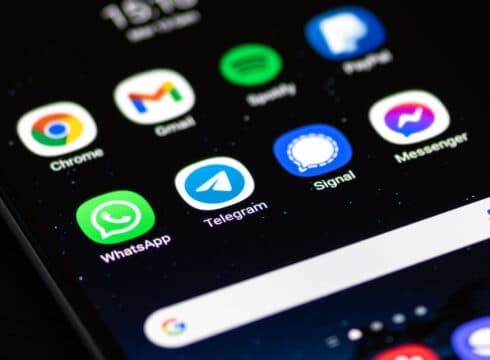The revised Telecommunication Bill may create an obligation on both telcos and OTTs to have the verified name as part of caller line identification
OTTs might be kept out of certain provisions in the next iteration of the Bill
The provision for caller name presentation might turn out to be a more stringent obligation in the revised Bill
Inc42 Daily Brief
Stay Ahead With Daily News & Analysis on India’s Tech & Startup Economy
The Department of Telecommunications (DoT) is reportedly considering making it mandatory for telecom players to share know-your-customer (KYC) details of their users with over-the-top (OTT) communication platforms like WhatsApp and Signal in the revised Telecommunication Bill.
“Such a provision will help OTTs display the verified name of a caller. The government is of the view that this will help in reducing impersonation and frauds,” a Moneycontrol report cited a source as saying.
The revised Bill may create an obligation on both telcos and OTTs to have the verified name as part of caller line identification, the report said.
In September this year, the government released the draft Indian Telecommunication Bill, 2022 which proposed extending the scope of the term telecommunication services to include OTT communication services.
While the clause to bring OTT communication services in the same category as telcos has stirred a debate, the government has reportedly been receptive to the concerns of the OTT apps on the issue.
As per the report, OTTs might be kept out of certain provisions in the next iteration of the Bill. However, the provision for caller name presentation might turn out to be a more stringent obligation.
The Telecom Regulatory Authority of India (TRAI) has also opposed the proposal in the Bill to regulate OTT telecommunication services. Earlier, the telecom sector regulator had advocated an issue-based approach towards OTT policymaking.
Various industry bodies such as the Internet and Mobile Association of India (IAMAI), the Internet Freedom Foundation (IFF), and the Asia Internet Coalition (AIC) have also opposed the move to bring OTTs under the same regulatory purview as telecom companies.
It has been a long-standing demand of telecom players to regulate OTT communication apps such as WhatsApp, Telegram and Signal to provide a “level-playing field”. However, the draft Bill has attracted criticism from the time it has been published on various clauses.
The Bill aims to replace the Indian Telegraph Act, 1885, the Indian Wireless Telegraphy Act, 1933, and the Telegraph Wires (Unlawful Possession) Act, 1950 and intends to create a future-ready regulatory framework.
{{#name}}{{name}}{{/name}}{{^name}}-{{/name}}
{{#description}}{{description}}...{{/description}}{{^description}}-{{/description}}
Note: We at Inc42 take our ethics very seriously. More information about it can be found here.


